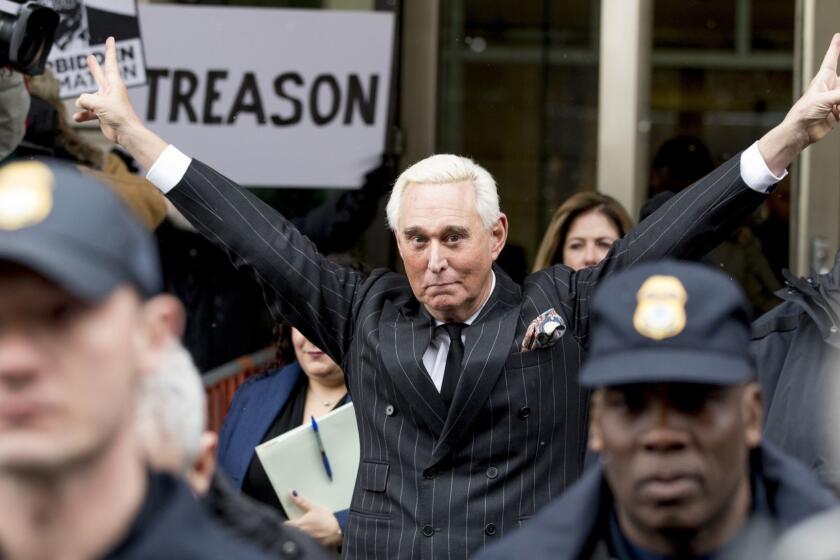Column: Roger Stone has more to answer for. Congress could make him talk
- Share via
President Trump’s commutation of Roger Stone’s sentence is a body blow to two core democratic values.
The first, and most immediate, is the principle of fair and impartial justice for all. It is a travesty that Stone — who was plainly guilty of serious crimes, who snubbed his nose repeatedly at the justice system, who continues to challenge his convictions — is now a free man. There is little that can be done now to reverse that injustice.
The second principle is the public’s right to know, in this case about the full story of the 2016 election and the Trump campaign’s complicity in Russia’s attack on American institutions. Here Stone may yet be called to account, and that should be a goal shared across political boundaries.
The perversion of justice in Stone’s case stinks. The commutation vividly illustrates Trump’s corrupt two-tiered system: the full force of law for everyone but his cronies and supporters. The special status of Trumpers provided Stone a pass on the most basic of the norms associated with such executive branch actions: People convicted of crimes are not supposed to be eligible for commutation until they begin to serve their sentences and cease challenging their convictions, neither of which Stone has done.
In fact, Stone’s commutation is arguably the most corrupt use of the president’s constitutionally granted “pardon power” in history and one of the most corrupt acts of Trump’s abysmal presidency. Other controversial pardons in history have provided preferential treatment to friends of the president; this one served to directly protect Boss Trump himself. Trump got Stone’s silence, Stone got freedom, and the public got shafted.
President Trump’s intervention in a criminal case connected to his own conduct is drawing fierce rebukes from Democrats and a few Republicans.
The exact nature of that shafting is not trivial. As special counsel Robert S. Mueller III’s report makes clear, Stone’s lies and his obstruction, including witness tampering are major reasons why to this day, there are large gaps in our understanding of the Russian attack on the 2016 election and the Trump campaign’s complicity in it.
Stone is the key witness on two not fully answered questions. The first is whether Trump and the campaign knew in advance about or even collaborated on the WikiLeaks dump of purloined emails from the Clinton campaign. Indeed, freshly unredacted material in the Mueller report indicates that Paul Manafort told Mueller that Stone had been tipped off and had passed that info along to Trump or the campaign. The second question is whether Trump lied in his written answers to Mueller when he claimed he couldn’t remember the specifics of any conversation with Stone in the six months before the election.
On both issues, the government should not be finished with Stone. He can and should be made to testify under penalty of perjury.
If he is subpoenaed Stone could assert his 5th Amendment right not to incriminate himself. Because his sentence was commuted, as opposed to his being pardoned, his convictions stand and the book is not fully closed on the crimes. His further testimony could be used against him as regards those crimes.
But there’s a fairly easy workaround, as Mueller’s deputy Andrew Weissmann explained in a New York Times op ed this week. If Stone takes the 5th, the government could grant him immunity, and his liability would disappear.
Immunity isn’t something the government offers casually, but it is appropriate when the value of witness testimony is paramount — as is the case here — and there is no other way to get it. Once immunized, if Stone were to persist in refusing to answer questions, he could be jailed for civil contempt until he agreed to talk. And if he lied (again), he would be subject to brand new perjury charges.
Mitt Romney and Pat Toomey have stepped up, but the majority on the right are not just willing but thrilled to excuse Trump’s inexcusable commutation of Roger Stone’s sentence.
Where should this testimony take place? I suggest Congress, either as part of regular congressional hearings or, possibly, under the aegis of a broad-based commission on Russian election interference, much like the commissions that investigated 9/11 and the Kennedy assassination. Such investigations are specifically meant to inform the American people.
It is galling that the president has managed to foil nearly every effort to impose punishment on his cronies and himself. The ledger is not yet closed, however, and a fuller reckoning may await them after Trump leaves office.
In the meantime, the American people and their lawmakers urgently need to get the fullest possible account of exactly what happened to our election infrastructure in 2016. Examining systemic failures and enemy attacks is what democracies do, not least because it is the only way to reduce the risk of similar harms going forward.
Trump seems to believe that by commuting Stone’s sentence he closed the book on what Stone knows, ensuring his buddy’s lifelong silence. Trump has the power to keep Stone out of prison for the felonies he has been convicted of, but keeping him silent is another matter. Commutation notwithstanding, it’s likely the day will come when Stone has to sing or sink.
More to Read
A cure for the common opinion
Get thought-provoking perspectives with our weekly newsletter.
You may occasionally receive promotional content from the Los Angeles Times.












